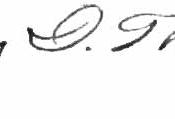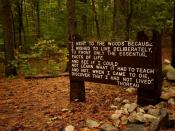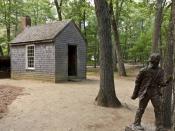This excerpt is from his famous essay, "On the Duty of Civil Disobedience". First, some background; in 1842, his brother John died of lockjaw. Three years later, Henry decided to write a book commemorating a canoe trip he had taken with John in 1839. Seeking a quiet place to write, he followed a friend's suggestion and built a small cabin on the north shore of Walden Pond on a piece of land owned by his friend and mentor, Ralph Waldo Emerson. He started work on his cabin in March of 1845. On the 4th of July, he moved in. Thus began one of the great and lasting experiments in life and thought of the whole of human experience. "I went to the woods because I wished to live deliberately, to front only the essential facts of life, and see if I could not learn what it had to teach, and not, when I came to die, discover that I had not lived."
Thoreau otherwise filled his time by working in his garden, talking with visitors, reading, and writing in his diary. But most of all, he walked and thought, and it's difficult to tell now which was the more important activity. It seems that, in his two years living in his little cabin in the woods he brought himself to a state of conscious living, where thought and action were harmoniously combined. This story is about his rejection of the world's definition of 'success' and so he demanded a life of personal freedom. He went to the woods, built a humble cabin on the edge of Walden Pond, Concord, Massachusetts...and learned about nature and life. He rejected the Establishment and all its trappings. He saw such possessions as fancy clothes and elaborate furniture as so much extra...


